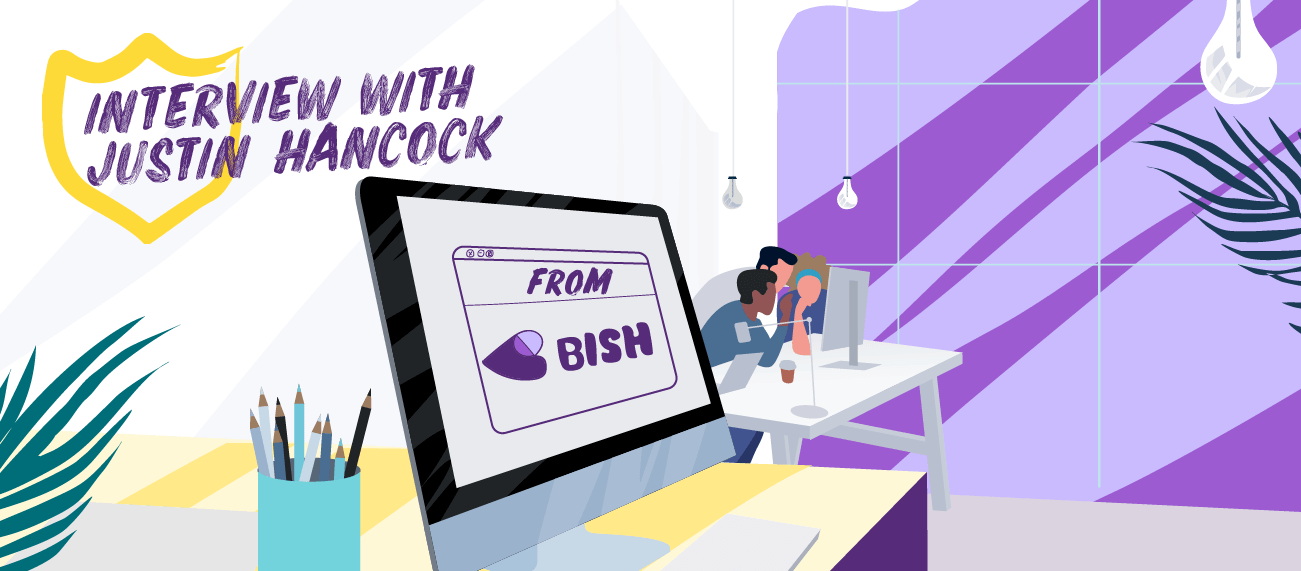How did you learn about sex for the first time? Did your mum quietly leave a book about the `birds and the bees’ on your bed and never mention it again?
Was your Sex Ed teacher visibly mortified while they rushed through a quick explanation of heteronormative sex without taking any questions?
Many myths, misconceptions and stigmas begin with bad sex education. We spoke to Justin Hancock, a sex educator with over 20 years of experience and founder of Bish, a sex and relationship website for anyone over 14, to find out more about the damage bad sex education can cause.
Who Is Justin Hancock?
In 2009, Justin Hancock created the website Bish. Ten years on, Bish’s consent training is frequently used by the sex education community and has become one of the most respected sex and relationship websites in the UK.
“I set out to create an online resource for young people,” Justin says, “because there weren’t many around at the time. I’m trying to make every page relevant for every young person, including people who are asexual, queer and disabled.
Why Bad Sex Education Is Messing Us Up
If your Sex Ed teacher is visibly uncomfortable, it can make you feel like sex isn’t something we can possibly have comfortable conversations about.
“I had one lesson from a biology teacher who tried to teach us about human reproduction,” says Justin, “I was 11. He was wearing a white coat and he was very embarrassed. He was being asked questions and he didn’t respond because he had no idea, so he was just awkwardly explaining how a penis goes into a vagina.”
“The impression I got was that sex is something we don’t talk about,” he continues, “and on the the rare occasions we do talk about it, sex is only about reproduction and only between a man and woman. So what does that mean for people who can’t have penis in vagina sex, or don’t want penis in vagina sex, or don’t want to reproduce?”
https://giphy.com/gifs/netflix-sex-ed-education-netflix-ce1bv0MCDXTa19LMHc
Source: Giphy
How Can Sex Education In Schools Be Improved?
Seven out of ten 11-15 year olds think sex and relationship education should be compulsary, according to a 2017 poll by children’s charity Barnardos.
This will soon become a reality: Government has laid out guidelines for compulsory sex education for primary and secondary age pupils. But making sex education compulsory doesn’t ensure it will be good.
“RSE is going to be compulsory in September 2020 without any money to help them do it,” Justin says, “teachers often deliver RSE without being trained and often without them experiencing what good sex and relationships education feels like themselves.”
“My sex education was terrible,” he continues, “and when I think about the teachers doing RSE, their sex education experience was probably the same, and that teachers teacher had a similar experience. The teachers need training and to do that the schools need budgets, so a lot of it comes down to money.”
In order to deliver good sex education, teachers need funding, time, resources and space in the pupils time table to deliver a thorough education – because one session of putting condoms on bananas in Year Nine isn’t enough.
“If You Have Sex, You Will Get Pregnant And Die”
This iconic Mean Girls quote is so funny because it’s sounds so familiar: young people are often told that if they have sex they will get pregnant, they will get STDs and their lives will be ruined. So how effective is scare-mongering in sex education?
“We use scare tactics around pregnancy and STIs,” Justin says, “but we know that scare tactics don’t work. In fact, they have the opposite effect, because young people don’t believe us anymore,”
“We need to give young people agency, to be able to choose what kind of sex they want to have and what kind of relationships they want to have,” he continues.
https://giphy.com/gifs/filmeditor-mean-girls-movie-3o7aTBBlZjYbJ62Sbe
Source: Giphy
Why don’t scare tactics work? Justin gives us one example: “A lot of people might think: ‘I’ve had unprotected sex ten times, so I must be infertile, so I’m never going to bother with contraception’. We’re not teaching young people the facts about pregnancy.”
Your likelihood of getting pregnant varies depending on where you are in your menstrual cycle – you are most fertile at the time of ovulation – but some Sex Ed teachers are not clear about how it all works, which leads to its own problems.
Not telling young people the realities of pregnancy means that if they do have unprotected sex a few times and do not get pregnant, they assume they never will because they believe it is a guarantee.
“If we teach young people: ‘if you have unprotected sex, you will get pregnant’, they might think: ‘well there’s obviously something wrong with me, so why bother?” says Justin.
How can we tread the line of giving young people the facts and promoting safe sex without misleading them? “We need to say: ‘these are the actual risks’. How you negotiate the sex is up to you, but it’s a negotiation you need to have and here are the tools you need to do that,” Justin says.
Is Sex Positivity A Good Approach To Sex Education?
At ellaOne, we believe there shouldn’t be a stigma around female sexuality, but there’s a difference between saying we should be open about sex and saying we all need to be doing it 24/7.
“The crucial thing about sexual pleasure is that it’s not as easy for some people to get pleasure as it is for others,” Justin says, “one in ten women who regularly have sex experience pain and one in 10 women have had sex against their will, so there are a lot of people having not very pleasurable sex.”
“I don’t think going ‘yay, it’s fun, we should all do it!’ is the way to go, because a lot of people are asexual or have difficulty with sex,” he continues.
It’s also important to be inclusive of everyone’s sexuality, including people who are not always represented in the media.
“A lot of people with disabilities are told that they’re not allowed to be sexual,” says Justin, “they are never mentioned in sex education, films or porn, so they’re reduced to asexual beings whether they want to be sexual or not.”
Where Do Myths About The Morning After Pill Come From?
The ellaOne team is trying to squash myths and misconceptions about emergency contraception and give you the facts you need to make an informed decision. Almost every day we hear falsehoods about how it works and how it affects you. Where do these ideas come from?
“A lot of it comes from outdated, old-fashioned sex education,” Justin says, “with early forms of emergency contraception, there were more side effects and there were two pills you’d have to take 12 hours apart, so you did probably have to take it in the morning because you don’t want to take it at 2 pm in the afternoon and get up at 2 am to take it.”
“We don’t have that anymore,” he continues, “ but a lot of the messages we have about emergency contraception are generally from the old pills, which is why we still call it the morning after pill.”
Outdated myths and misconceptions could stop people seeking emergency contraception because they don’t understand how it works.
That’s why we created Ask Ella, a series of informative articles backed up by experts and based on your top-ranking questions.
In order to counter myths and misconceptions, we need to talk openly about the morning after pill: the good, the bad, and the just plain awkward.
If you have taken the morning after pill, share your story below and help us change the narrative.
Words: Sophia Moss







